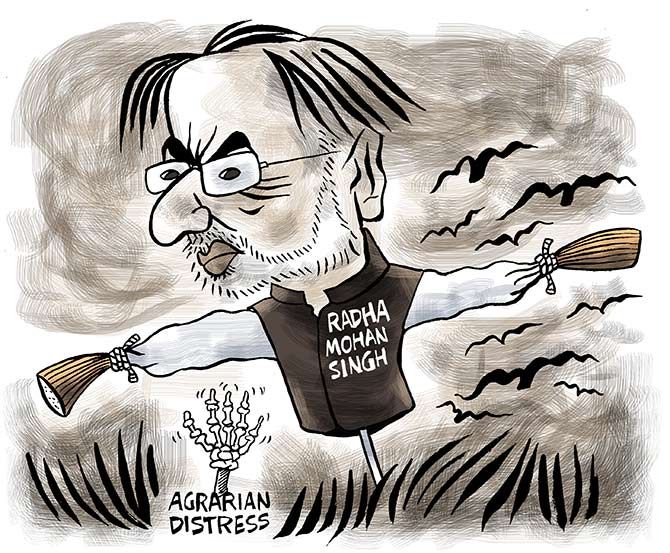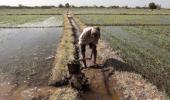'The BJP leadership and its agriculture minister must make up their mind on what kind of corrective measures will be needed for Indian agriculture at this point in time.'
'The sooner Mr Singh provides policy clarity on this vital issue, the better are the chances of India's agriculture and farmers emerging out of their current mess,' says A K Bhattacharya.
Illustration: Uttam Ghosh/Rediff.com

This may be a rhetorical question, but it needs to be asked in the current context. Radha Mohan Singh is the Union agriculture minister in the Narendra Modi government. Mr Singh joined the Cabinet of Mr Modi on May 26, 2014, and continues to be the Union government's minister for agriculture and farmers' welfare.
In this period, Mr Singh has announced many schemes to support Indian farmers, including the decision to raise minimum support prices for crops early this year. But he has not made too many statements in the wake of the results of the five assembly elections announced on December 11. This is both a surprise and a puzzle.
All the five states whose assembly poll results were declared last week are largely agrarian with a majority of their population depending on agriculture and allied activities as their main livelihood.
During the election campaign in at least four of these states -- Madhya Pradesh, Chhattisgarh, Rajasthan and Telangana -- the issue that towered above the rest pertained to agrarian distress.
The poll manifestos of the contending political parties also reflected that concern -- be it the Congress, the Bharatiya Janata Party or the Telangana Rashtra Samithi.
The message on what should be done to make agriculture more remunerative, therefore, should have been loud and clear for everyone after the assembly election results and more particularly for the BJP, which lost Madhya Pradesh, Chhattisgarh and Rajasthan, and even the TRS, which retained Telangana.
However, for the agriculture minister in the BJP-led Union government, the recognition of that message does not appear to be evident as yet.
A scan of the various media Web sites shows that on December 16, Mr Singh informed the Odisha government that it had won a Rs 10 million cash award for its best performance in food grain output in 2016-2017.
But there are no other statements from Mr Singh on agriculture or on any other related issues after the announcement of ahe Assembly election results on December 11.
It is not that Mr Singh usually shies away from issuing statements.
A couple of weeks before the results, on December 6, he denied the charges that demonetisation had adversely affected procurement of seeds by farmers.
And, on December 1, Mr Singh attacked the Congress governments of the past for not having implemented the recommendations for higher minimum support prices made by the M S Swaminathan Commission.
He also listed out three agriculture reforms the BJP government had introduced -- electronic linking of agricultural markets to help farmers discover better prices, a reformed agricultural insurance programme and a Rs 20 billion programme to establish 22,000 rural markets for farmers to help them double their income.
Now that the Congress has wrested three largely agrarian states from the BJP by promising among other things more debt waivers for farmers and an increase in MSPs, Mr Singh needs to give the country the benefit of his views on what could have gone wrong with his government's policies on agriculture and what needs to be done in the coming days.
The newly elected chief minister of Madhya Pradesh has already announced a debt waiver scheme for farmers in the state. Chhattisgarh and Rajasthan may follow suit soon. But will that solve the problem of farmers in these states?
Promising debt waivers for farmers has become quite fashionable for all political parties these days.
A similar promise was made by the BJP when it fought the Samajwadi Party in Uttar Pradesh and won the elections. Even without elections, the BJP-ruled Maharashtra government had announced a debt waiver for farmers in the state.
Punjab, Karnataka and Rajasthan have already announced debt waivers.
In 2017 and 2018, five states have announced debt waivers of over Rs 1.22 trillion for farmers. Yet, there seems to be no end to the financial woes of Indian farmers.
In sharp contrast, Telangana showed that promising debt waiver may not be a sure-shot way of winning elections. The Congress as well as the BJP had promised a debt waiver of up to Rs 2 lakh a farmer, double of what the TRS had indicated in its election manifesto. Farmer-voters in Telangana were not wooed away either by the Congress or the BJP in the hope of doubling their debt waiver amount.
What might have clinched the farmers' loyalty for the TRS was its promise of increasing the cash support amount per crop season by 25 per cent to Rs 5,000 per acre.
In the earlier scheme, a cash support of Rs 4,000 per acre for one crop season had entailed a total annual expenditure of over Rs 120 billion. Assuming that there will be two crop seasons a year, the exchequer's annual burden will now go up to Rs 150 billion.
The question that Mr Singh should answer is whether a debt waiver scheme has avoidable adverse consequences for credit discipline in the financial sector and a higher burden on the exchequer or whether a cash support scheme like Telangana's Rythu Bandhu makes better sense both by way of addressing farmers' distress and by securing better electoral dividends.
Mr Singh might say that addressing farmers' stress is a task better performed at the level of the states, since local administrations will be better qualified to understand their specific requirements.
Either way, the BJP leadership and its agriculture minister must make up their mind on what kind of corrective measures will be needed for Indian agriculture at this point in time.
And whether a short-term palliative like debt waivers or cash transfers needs to be supplemented or supplanted by more durable measures like increasing investments in the farm sector, aimed at improving farming productivity and technology use.
The sooner Mr Singh provides policy clarity on this vital issue, the better are the chances of India's agriculture and farmers emerging out of their current mess.











 © 2025
© 2025